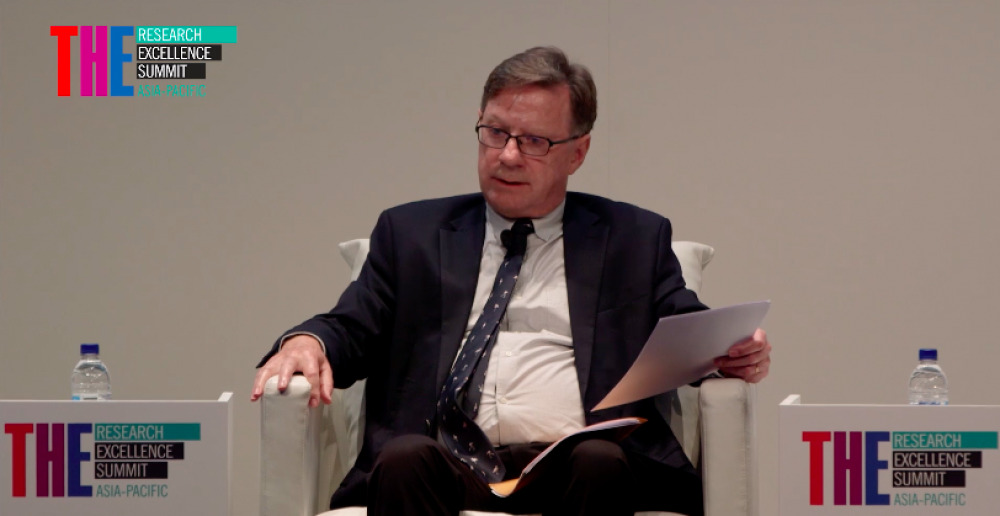APRU Secretary General, Christopher Tremewan, discussed the necessity of research partnerships and funding diversity in the context of APEC economies at the Times Higher Education 2019 Research Excellence Summit at UNSW on February 21. Building partnerships across the Asia-Pacific region for the global common good was his main focus.
Please read the full address below:
Conference Theme: Research for the Public Good
Introductory comments by APRU Secretary General: Christopher Tremewan
The necessity of partnerships and funding diversity to sustain research in the Asia-Pacific region
The theme of this session is a key issue for APRU, the Association of Pacific Rim Universities. It is core to our network strategy and to the considerable success we are having, as a network of 50 leading research universities, in building partnerships across the Asia-Pacific region for the global common good.
Having said that, I want to spend my introductory remarks outlining some main issues underlying this theme in the context of the diverse, dynamic and somewhat turbulent Asia-Pacific region in which we live and work.
I will leave most of the specifics of what APRU is doing for the subsequent discussion – or you can take a look at our website, apru.org, for examples of what are partnerships with with multilateral organisations, governments, business and local communities. You will find a strong evidence base for global impact in our recent report “Transformative Solutions to Asia-Pacific Challenges”.
The main issues: First, universities and international networks have to collaborate in the context of divergent public policy settings which incentivise or constrain our ability to address the common good across borders of many kinds. National funding regimes are determined by governments of various kinds incorporating apparently contradictory tendencies. They are a broad range: from democratic polities under threat of authoritarian white nationalism promulgating the ideology of austerity, to authoritarian, one-party states with their own ethnic essentialism committed to public funding of research universities.
This complexity continually raises the question of how to consolidate the autonomy and resources to play the public good role that we aspire to, going beyond what is minimally expected of us in terms of national public accountability to acting together on the major challenges facing the planet.
Secondly, in terms of incentives and constraints, there appears to be an increasing contradiction between research for the global common good (e.g. cross-border challenges of global health, sustaining the ecosystem, climate change, addressing inequality…) and research for purely national economic and political objectives. This divergence is driven by a geopolitical contest for technological dominance. In some cases a mutual interest for collaboration can be identified. In others, national interest exacerbates the difficulty of solving global crises collaboratively.
In short, we are encountering the complex, geopolitical dynamic of both competition and collaboration by nations in the drive for technological leadership for national security and economic growth.The US-China relationship is the most obvious example in the Asia-Pacific region and also is strategically most important for the countries of the region.
Investment in higher education and research is part of this dynamic. Strong research universities have emerged in the Asia-Pacific region along with the attendant issues of national imperatives governing research funding and the challenge of maintaining academic autonomy within very different systems.
Thirdly, paradoxically, this geopolitical environment of rapid change, turbulence and uncertainty is increasing the potential of networks for creating neutral international platforms for collaboration on global challenges, unofficial platforms that act as super-connectors, amplifying the impact of research on policy development and technical solutions at the international level.
As a network of universities, we see potential for widening the scope of collaborations and extending the arena for cooperation on addressing the global common good as a key aspect of developing relationships of trust across national borders and preventing their obstruction.
This is very promising. This is time that the opportunities of leveraging the more open spaces offered by these platforms and common cross-border challenges urgently can be taken up at scale.
A network with enormous reach and depth of knowledge is a huge resource especially as other forms of cooperation attenuate or disappear. While many bilateral relations are under strain, we remain a portal or connector that can be used to mobilize resources of knowledge and innovation to solve real problems and to advance understanding of our societies.
UN agencies. APEC, ADB, governments and global companies now seek partnerships with us, leveraging the collective research and education strengths of our members in highly creative initiatives on global challenges.
I am optimistic because I know the positive value of what research universities do, their ability to bring many benefits to society and to solving so many critical challenges. I know it is possible to build lasting relationships of trust and cooperation across borders of nation, culture, discipline, gender, language… even in times of tension and conflict.
In summary, underlying our success as a network, are three central factors:
- a commitment to multilateralism in the face of economic nationalism,
- the provision of international platforms which leverage network effects through multi-stakeholder partnerships,
- the assertion of ethical leadership through identifying and standing for the global common good.
We also appreciate more and more the network effects that arise from our flexible and de-centralized character:
- We are a little more emancipated from institutional interests and national policy contexts.
- We are able to embrace new ideas and trends, establish new partnerships and processes and to explore.
- Our members are embedded in a wide diversity of contexts and deep knowledge of this diversity, drawn together by a cross-disciplinary, cross-border network platform, is exactly what is required by the complex nature of the challenges we face and by the polarised international situation.
We are all in a new situation requiring new responses. I commend to you the value and the impact of realising the opportunities of networks and their partnerships.

